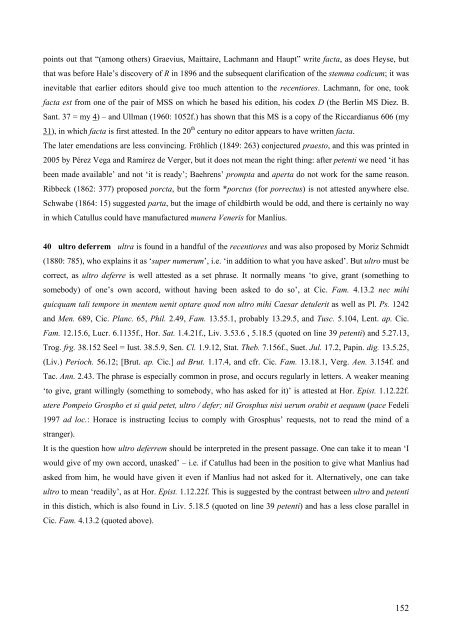CATULLUS 68 - Scuola Normale Superiore
CATULLUS 68 - Scuola Normale Superiore
CATULLUS 68 - Scuola Normale Superiore
Create successful ePaper yourself
Turn your PDF publications into a flip-book with our unique Google optimized e-Paper software.
points out that “(among others) Graevius, Maittaire, Lachmann and Haupt” write facta, as does Heyse, but<br />
that was before Hale’s discovery of R in 1896 and the subsequent clarification of the stemma codicum; it was<br />
inevitable that earlier editors should give too much attention to the recentiores. Lachmann, for one, took<br />
facta est from one of the pair of MSS on which he based his edition, his codex D (the Berlin MS Diez. B.<br />
Sant. 37 = my 4) – and Ullman (1960: 1052f.) has shown that this MS is a copy of the Riccardianus 606 (my<br />
31), in which facta is first attested. In the 20 th century no editor appears to have written facta.<br />
The later emendations are less convincing. Fröhlich (1849: 263) conjectured praesto, and this was printed in<br />
2005 by Pérez Vega and Ramírez de Verger, but it does not mean the right thing: after petenti we need ‘it has<br />
been made available’ and not ‘it is ready’; Baehrens’ prompta and aperta do not work for the same reason.<br />
Ribbeck (1862: 377) proposed porcta, but the form *porctus (for porrectus) is not attested anywhere else.<br />
Schwabe (1864: 15) suggested parta, but the image of childbirth would be odd, and there is certainly no way<br />
in which Catullus could have manufactured munera Veneris for Manlius.<br />
40 ultro deferrem ultra is found in a handful of the recentiores and was also proposed by Moriz Schmidt<br />
(1880: 785), who explains it as ‘super numerum’, i.e. ‘in addition to what you have asked’. But ultro must be<br />
correct, as ultro deferre is well attested as a set phrase. It normally means ‘to give, grant (something to<br />
somebody) of one’s own accord, without having been asked to do so’, at Cic. Fam. 4.13.2 nec mihi<br />
quicquam tali tempore in mentem uenit optare quod non ultro mihi Caesar detulerit as well as Pl. Ps. 1242<br />
and Men. <strong>68</strong>9, Cic. Planc. 65, Phil. 2.49, Fam. 13.55.1, probably 13.29.5, and Tusc. 5.104, Lent. ap. Cic.<br />
Fam. 12.15.6, Lucr. 6.1135f., Hor. Sat. 1.4.21f., Liv. 3.53.6 , 5.18.5 (quoted on line 39 petenti) and 5.27.13,<br />
Trog. frg. 38.152 Seel = Iust. 38.5.9, Sen. Cl. 1.9.12, Stat. Theb. 7.156f., Suet. Jul. 17.2, Papin. dig. 13.5.25,<br />
(Liv.) Perioch. 56.12; [Brut. ap. Cic.] ad Brut. 1.17.4, and cfr. Cic. Fam. 13.18.1, Verg. Aen. 3.154f. and<br />
Tac. Ann. 2.43. The phrase is especially common in prose, and occurs regularly in letters. A weaker meaning<br />
‘to give, grant willingly (something to somebody, who has asked for it)’ is attested at Hor. Epist. 1.12.22f.<br />
utere Pompeio Grospho et si quid petet, ultro / defer; nil Grosphus nisi uerum orabit et aequum (pace Fedeli<br />
1997 ad loc.: Horace is instructing Iccius to comply with Grosphus’ requests, not to read the mind of a<br />
stranger).<br />
It is the question how ultro deferrem should be interpreted in the present passage. One can take it to mean ‘I<br />
would give of my own accord, unasked’ – i.e. if Catullus had been in the position to give what Manlius had<br />
asked from him, he would have given it even if Manlius had not asked for it. Alternatively, one can take<br />
ultro to mean ‘readily’, as at Hor. Epist. 1.12.22f. This is suggested by the contrast between ultro and petenti<br />
in this distich, which is also found in Liv. 5.18.5 (quoted on line 39 petenti) and has a less close parallel in<br />
Cic. Fam. 4.13.2 (quoted above).<br />
152






